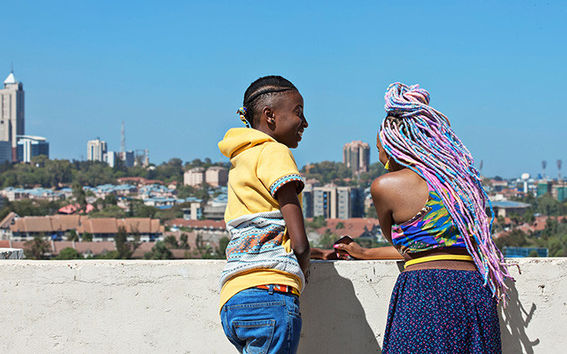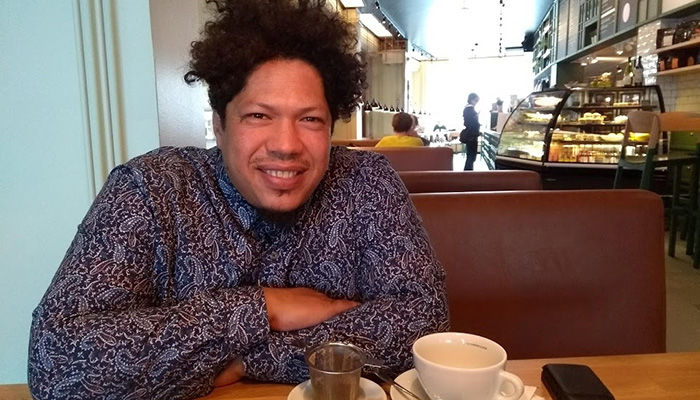A tale of forbidden love from Nairobi

A preacher rails against gay marriage. A Kenyan woman with waist-length pink braids is seated amongst the congregation. Next to her is a short-haired woman, who rebuffs the braided woman’s attempt to hold her hand. The film Rafiki (Friend), set in Nairobi, depicts two young women who are forced to cover up their relationship because both their fathers are angling for the same political office.
Homosexuality is not against the law in Kenya, but the Kenya Film Classification Board nevertheless banned Rafiki from being screened in the country because it was seen as “clearly having the aim of promoting lesbianism”. The movie had it’s world premiere at the Cannes Film Festival soon after the ban was announced.
However, cinematographer Christopher Wessels informs us that Rafiki’s ban was recently lifted temporarily after a court appeal. The film has thus received at least limited screen time at Kenyan movie theatres.
“Rafiki has also been entered into several film festivals around the world.”
We are seated at Lasipalatsi cafe in Helsinki, a stone’s throw away from the Love & Anarchy festival’s info point at the cinema Bio Rex. Rafiki just had its Nordic premiere as part of the festival.
Wessels has a history of cooperation with the movie’s South African producer Steven Markovitz.
”Steven called me to ask if I’d want to be the cinematographer in this movie. I immediately said yes.”

New home in Finland
South African Christopher Wessels (b. 1976) moved from Cape Town to Turku a decade ago. He was motivated by love, having met his better half some ten years earlier in South Africa.
Wessels studied cinematography at the AFDA School in South Africa before being accepted to Aalto’s Visual Cultures, Curating and Contemporary Art Master’s programme, which he completed in 2016.
“I was the oldest participant of my year at both seats of learning! Still, it was important to find your own crowd at each university. The people you might be working with in the future.”
Wessels was one of the founders of the Third Space gallery in Helsinki. He left Third Space a couple of years ago to join another collective, which then established the Museum of Impossible Forms art centre in the Kontula district of Helsinki.
Wessels has served as the cinematographer in, among other things, the film Action Comandante (South Africa 2016) about South African freedom fighter Ashley Kriel as well as the movie Madame B(Netherlands 2016). He has also been involved in the Children’s Library project at Åbo Akademi University.
Long days of shooting
Rafiki’s Kenyan director Wanuri Kahiu also wrote the film’s screenplay, which she based on the novella Jambula tree by Monica Arac de Nyeko, a Nairobi-based Ugandan writer.
“The novella is really beautiful,” says Wessels.
Rafiki was shot over one month in Nairobi. Wessels says the shoot days lasted from early dawn to late at night with only Sundays off. He is quite used to the high stress of filmmaking by now, however, and says there were no problems with shooting Rafiki in Kenya in spite of its volatile subject matter.
“Nairobi is a cool place. We shot the entire film in the same neighbourhood, in a sense making the area into one of the film’s characters.”
Helsinki International Film Festival – Love & Anarchy 20-30 September 2018.
Text and portrait of Christopher Wessels: Elisa Helenius.
Read more news

Environmental Structure of the Year 2025 Award goes to Kalasatama-Pasila tramway
The award is given in recognition of meritorious design and implementation of the built environment. Experts from Aalto University developed sustainability solutions for the project.Landscape architect Sara Korkeamäki received the Lappset scholarship
In her thesis, Korkeamäki examines the multidimensional challenge of biodiversity loss and seeks solutions to it through landscape architecture.
Professor of Ownership Samuli Knüpfer received the OP Financial Group Research Foundation's recognition award
OP Financial Group Research Foundation may award individuals who have significantly promoted economic research in fields supported by the foundation






